Report Webinar: 5GCAR

Global5G.org hosted the two-part webinar series with 5GCAR on 01 October 2019 as the first example of supporting 5G PPP project results. The idea stems from the chair of the Verticals TF with a view to assessing R&I promises versus actual results at project end. Discussions in the Technology Board led to the webinar organisation with 5GCAR. It is hoped that the successful outcome of these webinars will continue in 5G PPP phase 3.
5GCAR PART 1 Overview
Within the context of Europe’s 5G public private partnership (5G PPP), 5GCAR has pioneered 5G radio and network improvements that will help achieve reliable 5G networks for connected automated driving (CAD).
5GCAR has proven the added value of 5G for connected cars from multiple perspectives, spanning business models, spectrum, innovative solutions for radio access network (RAN), system architecture and the security and privacy framework.
The first of this two-part webinar series explores the 5GCAR demonstrations at the UTAC-CERAM test track in Linas, France in June 2019. These demonstrations showcase new cooperative and connected V2X applications using 5G cellular-vehicle-to-everything (C-V2X) communication technologies. The press release on the 5GCAR demonstrations in
Chair and Panellists
- Stephanie Parker, Trust-IT and Global5G.org coordinator – Welcome
- Mikael Fallgren, Senior Researcher at Ericsson – Introduction
- Bastian Cellarius, Senior Researcher at Ericsson – 5GCAR demonstrations
- John Favaro, Trust-IT and Deputy Global5G.org coordinator – Q&A
Main takeaways:
#1 – 5GCAR: a win-win partnership between telecommunications and automotive industries shaping the future of Advanced Driver Assistance Systems (ADAS), automated and safer driving.
#2 – Cooperative manoeuvre: lane merge coordination, vehicle entering a highway safely and efficiently.
#3 – See-through sensor sharing: enabling overtaking manoeuvres by eliminating view blockage.
#4 – Long-range sensor sharing for cooperative perception: collision predictions and warning algorithms.
#5 –Vulnerable Road user protection: preventing accidents with pedestrians, cyclists and motorcyclists with network-based positioning and collision prediction.
5GCAR PART 2 Overview
5GCAR has developed new cooperative and connected V2X applications using 5G cellular-vehicle-to-everything communication technologies. This multi-perspective webinar zooms in on use cases, business and spectrum aspects, the radio interface and architecture underpinning the research and innovation achievements of the project.
Chair and Panellists
- Stephanie Parker, Trust-IT and Global5G.org coordinator – Welcome.
- Mikael Fallgren, senior researcher at Ericsson and 5GCAR coordinator – Focus of the webinar.
- Antonio Barciela, R&D Connected Vehicle Program Manager, PSA Groupe – The 5GCAR scenarios, business and spectrum aspects.
- Zexian Li, senior specialist at Nokia Bell Labs – 5G V2X Radio Interface
- Massimo Condolucci, senior researcher at Ericsson Research – Enhancements to 5G system architecture and security for V2X
- John Favaro, Trust-IT and Deputy Global5G.org coordinator – Q&A
Main takeaways:
#1 - Connectivity becomes a must from automation level 4 (high/full automation).
#2 – 5G technical features are enabling new business models for various stakeholders in the value chain though disruptions may occur in the evolving ecosystem.
#3 – New market opportunities include CAM services, security pseudonymisation. Cost reduction will be a factor in rollout and usage.
#3 – Medium and low frequencies are most suitable for V2X use cases, with coverage having priority over bandwidth in the current set of use cases. However, usage is still under discussion and decision delays may slow down rollouts.
#4 – 5GCAR has brought to V2X enhancements in 5G radio interfaces, as well as inputs to the standardisation process. Inputs for 3GPP Releases 15 and 16 span resource allocation and management, 5G NR Rel-15 and beyond, sidelink design and positioning. Multi-antenna techniques and full duplex will be targeted in future releases (e.g. Rel-17/18).
#5 – Further discussions on privacy are needed to understand compliance with GDPR, e.g. CAM/CPM and issues such as the implications of driver/owner consent.
#6 – Multi-link exploitation is a key feature for supporting use cases with diverse requirements.
#7 – Multi-operator support is needed to enable seamless and low latency communication between vehicles and road users, regardless of the MNO each single actor is subscribed to.
#8 – The exchange of information between the network and applications is necessary for application adaptation and network optimisation for service delivery enhancements.



